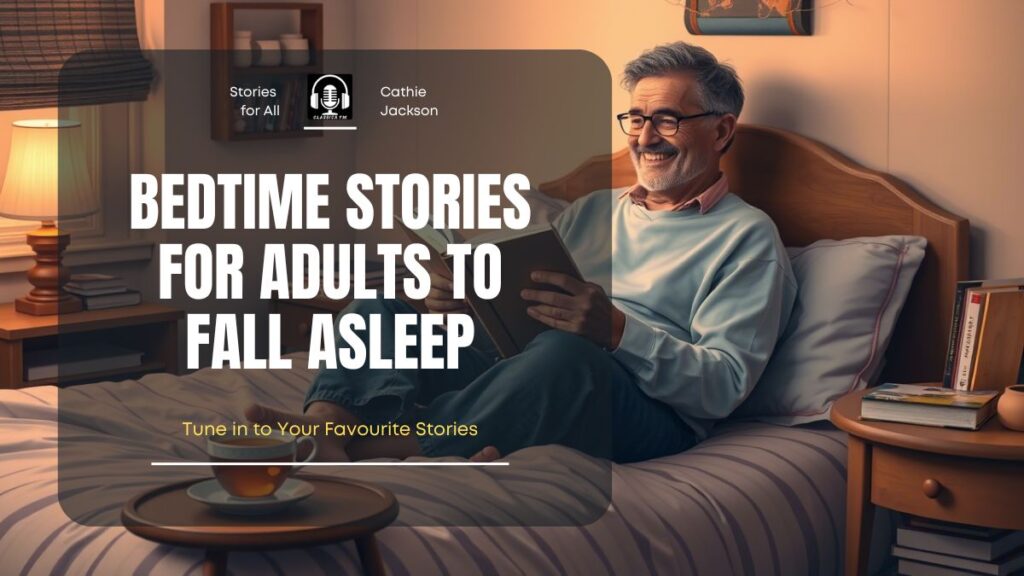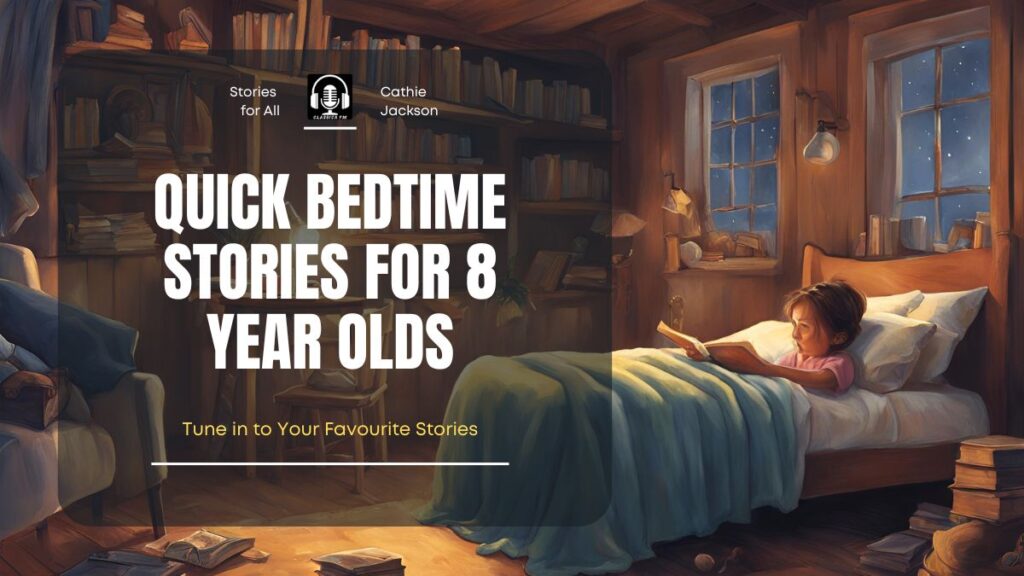Every night is a new adventure! Short Bedtime Stories for Kids With Moral aren’t just stories, they take you to places where anything feels possible. As you snuggle under the blankets and get comfortable, you’ll meet characters who feel real, face little challenges, and discover something meaningful along the way.
Each story has a simple message: kindness, honesty, patience, or courage. Some will make you smile, some might remind you of something in your own life, and all of them will help you drift off to sleep feeling warm and at peace.
So get cozy, close your eyes, and let’s begin because every great adventure starts with “Once upon a time…”
20 Short Bedtime Stories for Kids With Moral
Make bedtime special with 20 Short Bedtime Stories for Kids With Moral. Each story is easy to follow and teaches kindness, honesty, patience, or courage. Snuggle up and enjoy a peaceful night!
The Shy Moonbeam

Luna, a timid moonbeam, is afraid of shining too brightly and prefers to hide behind the clouds. She believes her light is too weak to matter. But one particularly dark night, the forest is filled with frightened animals who can’t see their way.
Owls struggle to find their nests, rabbits hesitate to move, and even the fireflies seem lost. Seeing their distress, Luna hesitates at first but then gathers her courage. Slowly, she lets her light shine.
The moment she does, the forest glows in a soft, gentle light, guiding the animals and bringing them comfort. They thank her, and for the first time, Luna realizes her light—no matter how small—makes a difference.
Moral: Your unique gifts, no matter how small, can make a big difference.
The Generous Cloud

Cloudy drifts lazily across the sky, enjoying his peaceful journey. One day, he spots a tiny flower struggling to survive in the middle of a dry, cracked desert. The sight tugs at his heart, but he hesitates—what if his rain isn’t enough? What if he runs out of water?
As he ponders, the flower wilts further. Realizing he can’t just watch, Cloudy takes a deep breath and releases a gentle shower. The flower perks up instantly. Encouraged, Cloudy continues to pour rain, and soon, the lifeless desert blooms into a lush oasis.
Butterflies return, birds find shelter, and the once-barren land is full of life.
Moral: A little kindness can transform a barren world.
The Turtle’s New Shell
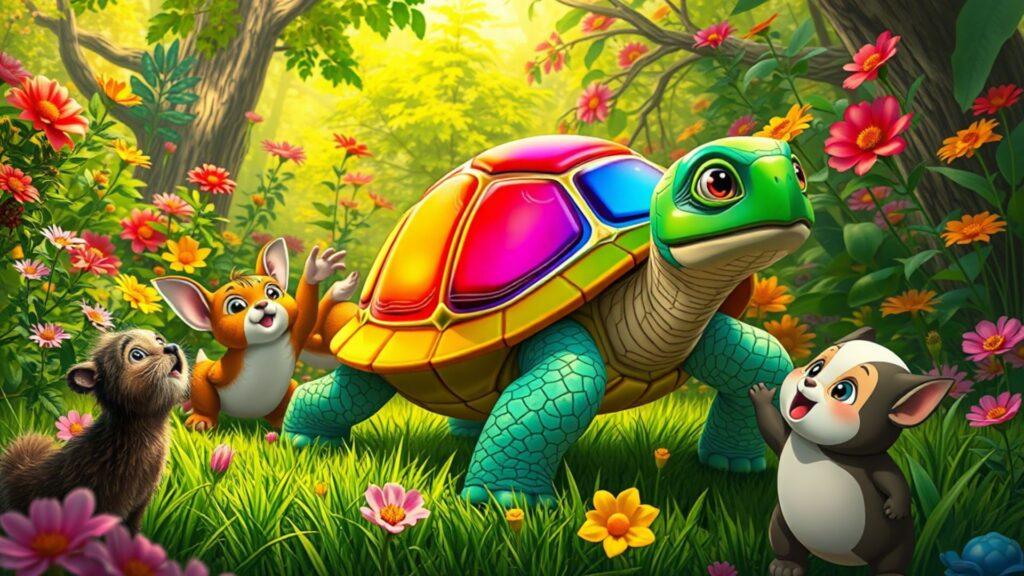
Toby the turtle often complains about his heavy, slow shell. He envies the rabbits and squirrels that dart through the forest with ease. One day, a fierce storm arrives, sending powerful winds and heavy rain across the land.
Animals scramble for shelter, but many struggle to stay safe. Toby tucks himself inside his shell and waits. When the storm finally passes, he emerges unharmed, realizing his shell has protected him from the harsh weather.
Unlike the other animals, who are cold and soaked, Toby is safe and dry. From that day on, he appreciates his shell, knowing it is his greatest strength.
Moral: Embrace what makes you different—it may be your greatest strength.
The Rabbit’s Lost Carrot

Ruby the rabbit carefully hides her precious stash of carrots for winter. One day, she rushes to dig them up, only to find her hiding spot empty. Panicked, she searches frantically but finds nothing. Frustrated and on the verge of tears, she decides to ask for help.
Her friends—squirrels, birds, and even a curious fox—join the search. Working together, they uncover the missing carrots, buried deeper than Ruby had remembered.
Overjoyed, she shares her food as thanks. She realizes that asking for help not only solved her problem but also brought her closer to her friends.
Moral: Don’t be afraid to ask for help; teamwork makes challenges easier.
The Wolf Who Loved Poetry
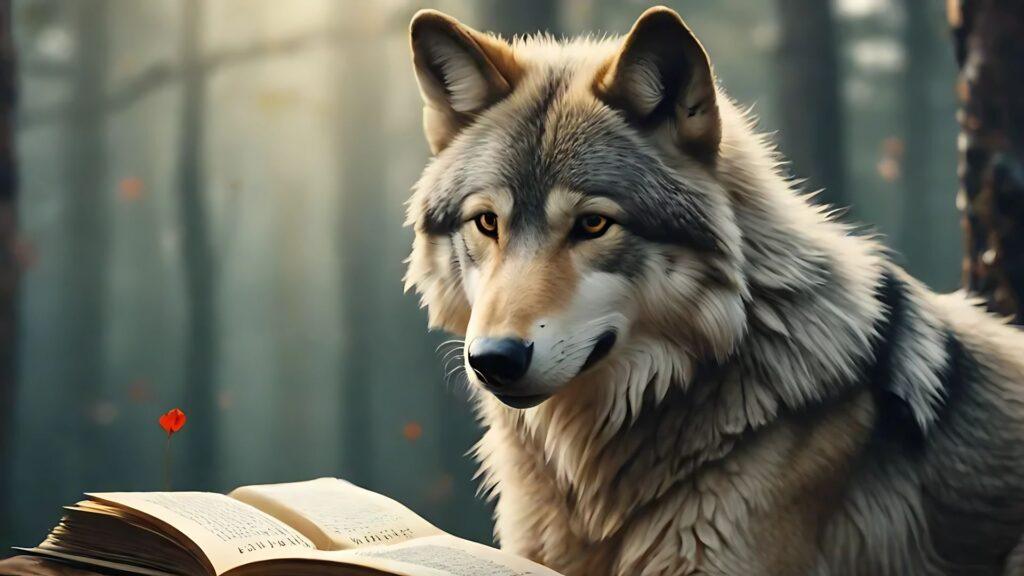
Wesley the wolf is different from the others in his pack. While his peers enjoy hunting and howling at the moon, Wesley spends his nights writing poetry. His pack laughs at him, calling his passion silly. Feeling out of place, Wesley almost gives up—until one night, he recites a poem aloud under the full moon.
The words are so moving that even the toughest wolves stop to listen. Slowly, his pack realizes that Wesley’s poetry is a gift, expressing emotions they never knew they had. Instead of mocking him, they start requesting poems, and Wesley finally feels accepted.
Moral: Stay true to yourself, even if others don’t understand your passion.
The Magic Paintbrush

A kind-hearted child named Lian loves to paint. One day, she finds an old paintbrush in the forest. When she uses it, something magical happens—her drawings come to life! She paints food for the hungry, streams for the dry fields, and even birds that fly into the sky.
Soon, her village flourishes with color and joy. However, a greedy ruler hears of her gift and demands she paint riches for him. Instead, Lian outsmarts him by painting a river that washes him away. She continues using her talent to spread beauty and kindness, making the world a better place.
Moral: Use your talents to spread beauty and kindness.
The Selfish Giant

A giant owns a beautiful garden, but he refuses to let children play in it. He builds a tall wall, keeping the garden for himself. But soon, something strange happens—spring never arrives. His garden remains cold and lifeless while the rest of the land blooms.
One day, the giant sees a small child trying to climb the wall. Touched, he finally opens his garden to the children. As they laugh and play, the flowers bloom again, and the sun shines warmly. The giant realizes that kindness and sharing bring true happiness, not walls and isolation.
Moral: Sharing and kindness can bring warmth and renewal.
The Monkey and the Crocodile

A clever monkey and a crocodile become friends. The monkey shares sweet fruit from his tree, and the crocodile enjoys his company. But one day, the crocodile’s wife grows jealous and demands the monkey’s heart for a meal.
Torn between friendship and loyalty, the crocodile tricks the monkey into riding on his back. Midway across the river, he reveals his plan. Thinking quickly, the monkey laughs, claiming he left his heart in the tree.
The foolish crocodile swims back, giving the monkey a chance to escape. He realizes not everyone can be trusted and vows to be more careful.
Moral: Be cautious with trust and value your own wit.
The Elephant and the Blind Men
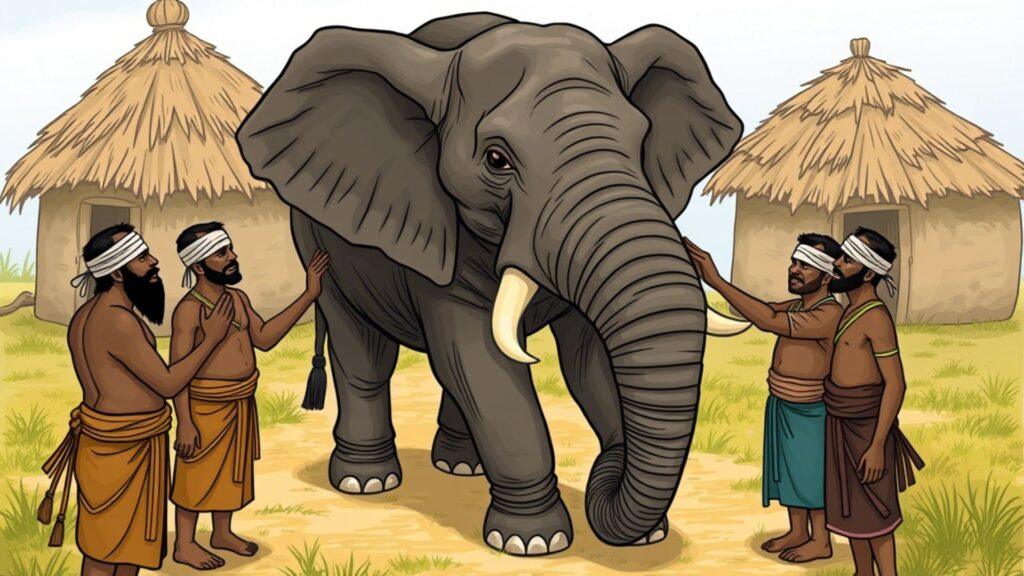
Six blind men encounter an elephant for the first time. One touches its trunk and insists the elephant is like a snake. Another feels its leg and argues it’s like a tree. Each man describes a different part—ears, tail, tusk—convinced they know the truth.
They argue fiercely until a wise man explains that they are all partly right but need to see the whole picture. Realizing their mistake, they learn to listen to one another and understand that true knowledge comes from considering different perspectives.
Moral: True understanding comes from seeing the bigger picture.
The Wind and the Sun

The Wind and the Sun watch a traveler walking along the road. The Wind boasts that he is stronger and challenges the Sun to a contest—who can make the traveler remove his coat? The Wind blows fiercely, but the stronger he blows, the tighter the traveler clings to his coat.
Then, the Sun gently shines with warmth. Slowly, the traveler feels hot and willingly takes off his coat. The Sun wins, proving that warmth and kindness achieve more than force and aggression.
Moral: Kindness and gentle persuasion are more effective than brute force.
The Farmer and His Sons
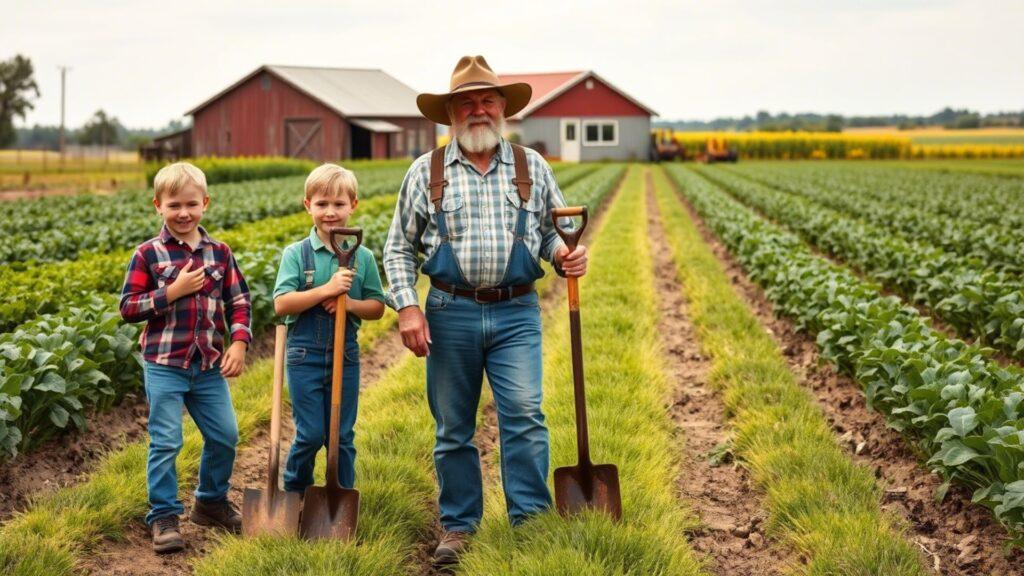
An old farmer, worried that his sons are always quarreling, decides to teach them a lesson. He tells them about a hidden treasure buried in their fields. Excited, the sons dig every inch of the land but find nothing. Disappointed, they give up.
But soon, the tilled soil makes way for a rich harvest. The farmer then explains that the real treasure was their hard work, which turned the barren land into fertile fields. The brothers finally understand that their father’s wisdom was worth more than gold.
Moral: Hard work and perseverance yield rich rewards.
The Golden Egg
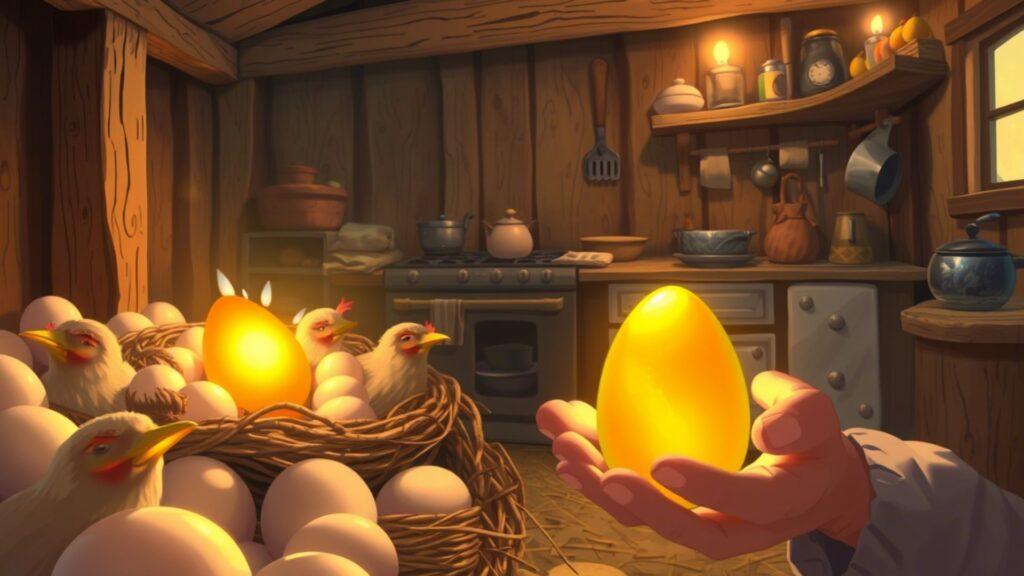
A poor farmer discovers that his goose lays a golden egg every day. At first, he is grateful, selling one egg at a time and living comfortably. But soon, greed takes over. Wanting all the gold at once, he kills the goose, expecting to find a stash of golden eggs inside.
Instead, he finds nothing. With no way to get more golden eggs, the farmer realizes his impatience and greed have cost him everything.
Moral: Greed can destroy what patience and gratitude have built.
The Lion and the Mouse

A mighty lion captures a tiny mouse but decides to let him go instead of eating him. The mouse promises to return the favor one day, though the lion laughs at the idea. Later, the lion gets caught in a hunter’s net, roaring in frustration.
The little mouse hears his cries and quickly gnaws through the ropes, setting the lion free. The lion finally understands that even the smallest act of kindness can make a big difference.
Moral: Kindness is never wasted, no matter how small you are.
The Honest Woodcutter
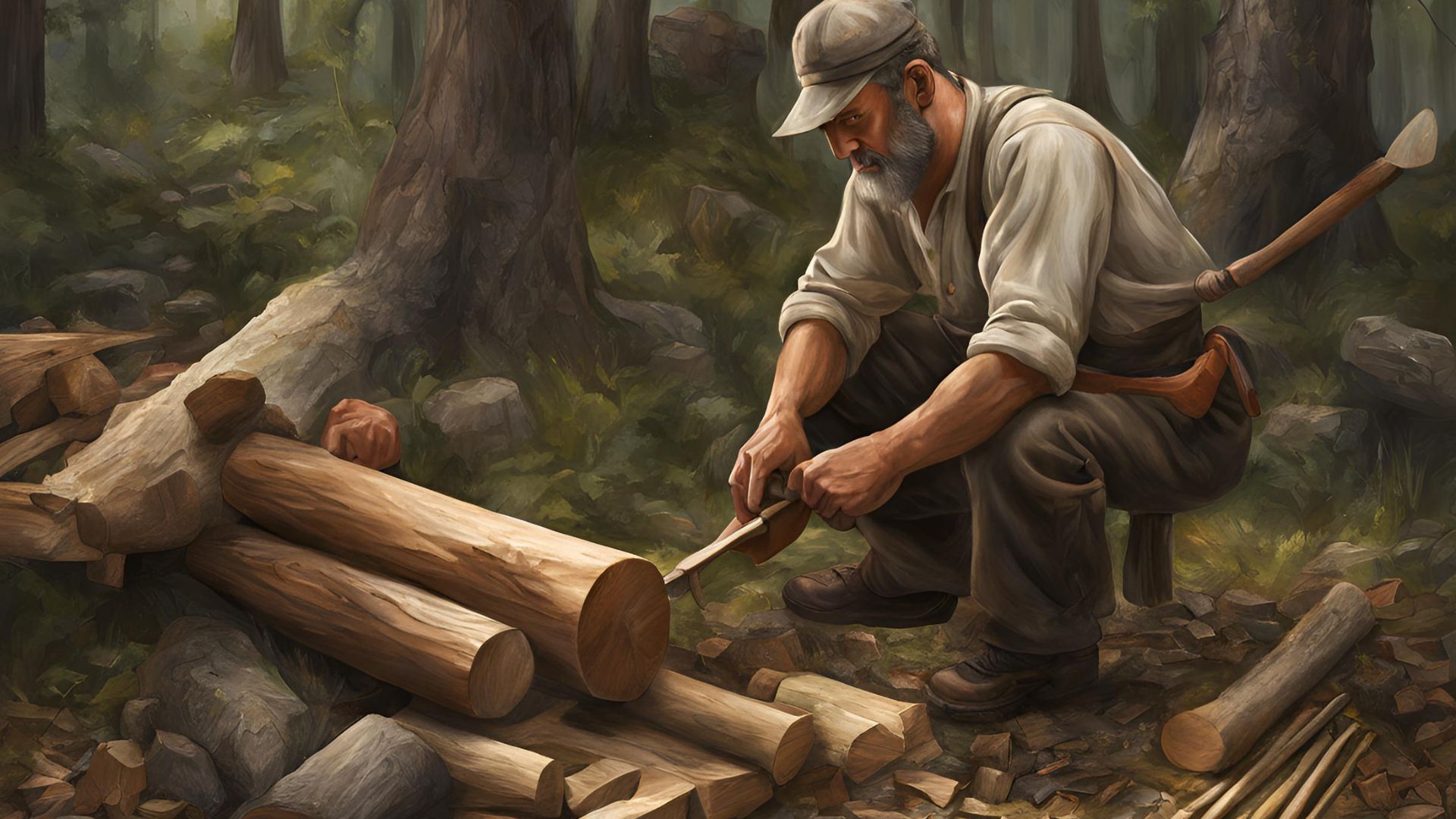
A poor woodcutter accidentally drops his axe into a deep river. As he laments his loss, a mystical figure emerges and offers him a golden axe. The woodcutter, though tempted, honestly says it is not his.
The figure then offers a silver axe, but again, he refuses. Finally, the figure presents his own worn-out axe, which he gratefully claims. Impressed by his honesty, the figure rewards him with all three axes.
Moral: Honesty is always rewarded.
The Thirsty Crow
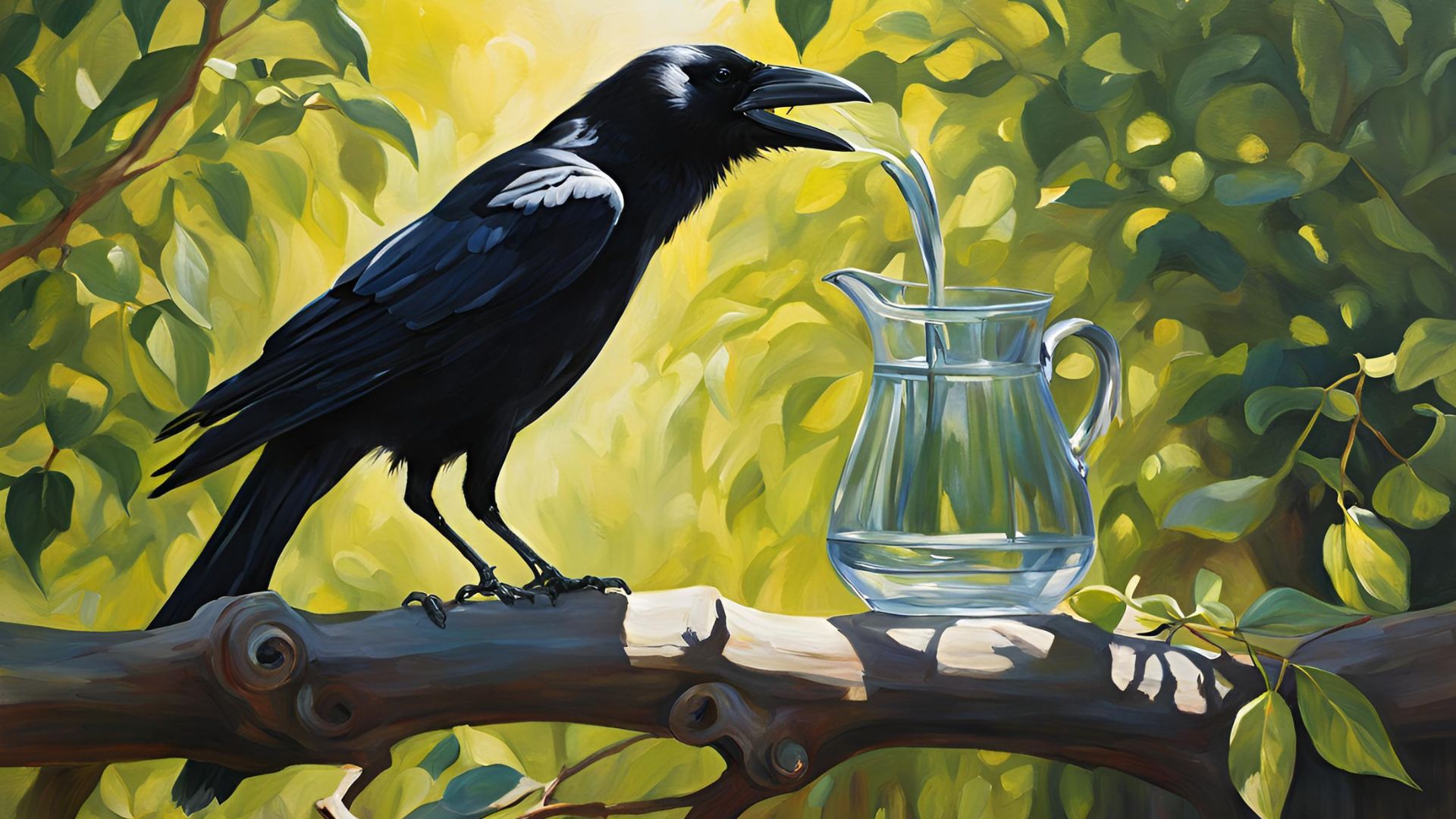
On a scorching day, a thirsty crow searches for water. He finds a pitcher with a little water at the bottom, but his beak can’t reach it. Instead of giving up, he comes up with a plan. He drops small pebbles into the pitcher one by one, slowly raising the water level.
Finally, the water reaches the top, and the crow drinks to his heart’s content.
Moral: Creativity and persistence can solve even the toughest problems.
The Bundle of Sticks

A father wants to teach his quarreling sons the value of unity. He gives each of them a bundle of sticks and asks them to break it. They try and fail, unable to break the bundle. Then, he gives each son a single stick and asks them to break it.
This time, they break them easily. The father explains that when they stand together, they are strong, but divided, they are weak. His sons finally understand the power of unity and promise to support each other in the future.
Moral: Together, we are stronger than when we are apart.
The Giving Tree

A tree loves a young boy and gives him everything she has. She offers him shade, fruit, and her branches to climb. As the boy grows older, his needs change. He asks for money, so the tree gives him her apples to sell. He asks for a house, so she gives him her branches to build it.
Finally, when the boy is old, he returns seeking a place to rest. The tree, now just a stump, offers her last gift—her remaining space. The boy, now a man, rests, and the tree is happy to have given him everything.
Moral:
True love means giving without expecting anything in return.
The Ugly Duckling

An awkward and misunderstood duckling is shunned by the other animals. He feels lonely and different, and even the swans reject him. Over time, he grows bigger and stronger, and one day, he catches a glimpse of his reflection in the water.
To his surprise, he has turned into a beautiful swan. The other swans welcome him, and he finally realizes that his journey of self-acceptance led him to discover his true beauty.
Moral: Embrace your unique journey; transformation and self-acceptance lead to greatness.
The Fox and the Grapes

A hungry fox spots a bunch of grapes hanging high on a vine. He jumps and stretches, but no matter how hard he tries, he can’t reach them. After many failed attempts, he gives up and walks away, telling himself that the grapes must be sour and not worth the effort.
His frustration fades, and he convinces himself that the grapes were never desirable anyway.
Moral: It’s easy to downplay what we can’t have; focus on what’s achievable instead.
The Three Little Pigs

Three little pigs each build their homes using different materials: straw, sticks, and bricks. When a big bad wolf comes, he easily blows down the straw and stick houses. But when he tries to blow down the brick house, he fails.
The pigs who built with stronger materials are safe, and the wolf runs away. The pigs realize that careful planning and hard work protect them from unexpected dangers.
Moral: Planning and hard work protect you from unexpected challenges.
The Ant and the Grasshopper

All summer, the hardworking ant gathers food and prepares for winter, while the carefree grasshopper plays and sings. When winter arrives, the ant has enough to survive, but the grasshopper, having made no preparations, finds himself cold and hungry. He asks the ant for help, but the ant reminds him that work must come before play. The grasshopper realizes too late the importance of planning for the future.
Moral: Hard work and preparation today ensure security for tomorrow.
The Boy Who Cried Wolf
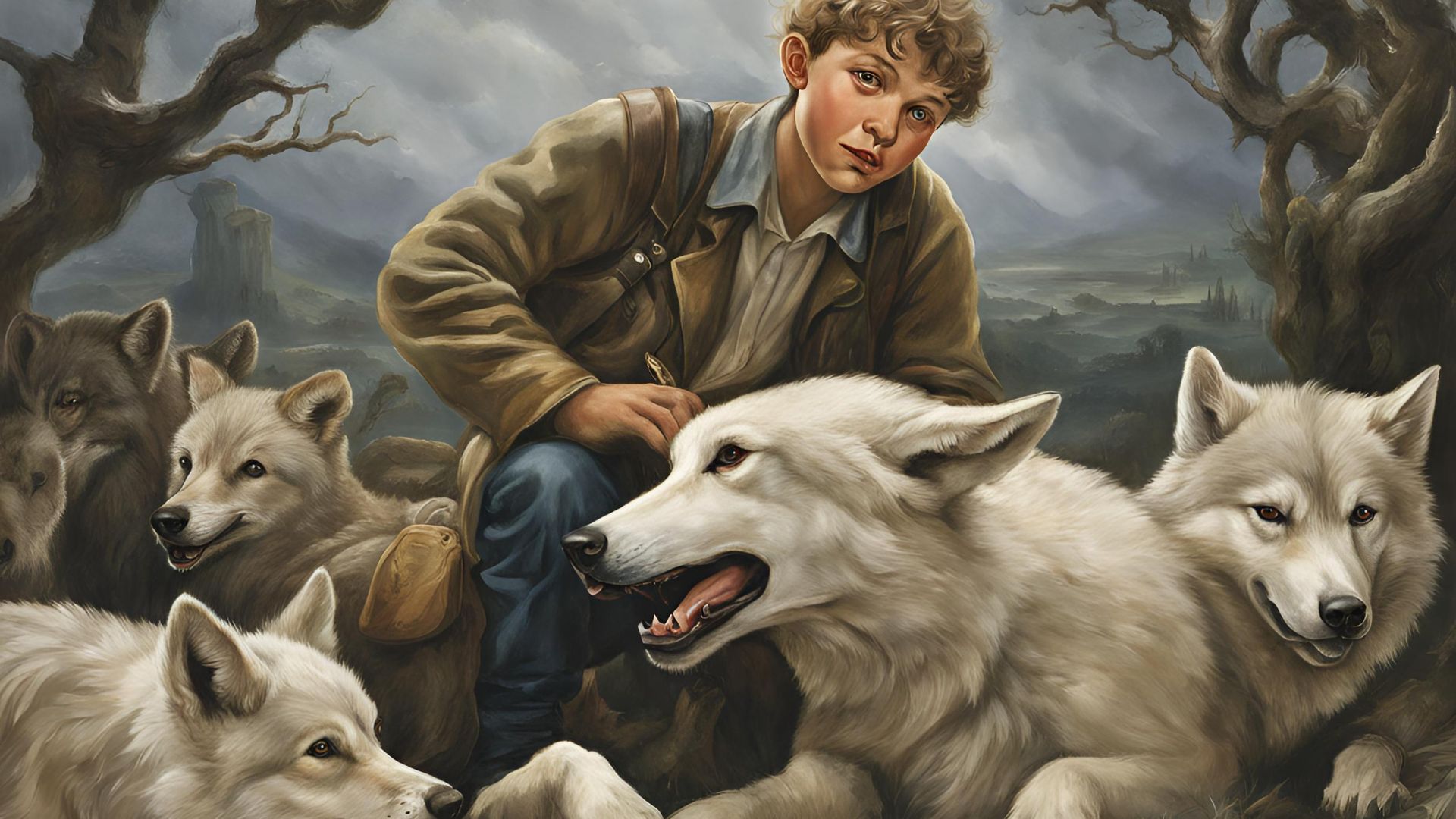
A shepherd boy gets bored while watching his sheep and decides to play a trick. He shouts, “Wolf! Wolf!” The villagers rush to help, only to find no wolf. He laughs, enjoying the attention. He repeats the trick a few more times, until one day, a real wolf appears.
He cries for help, but this time, no one believes him. The wolf attacks the flock, and the boy learns that lying can have serious consequences.
Moral: Honesty builds trust, but lies can make people stop believing you.
The Goose That Laid the Golden Eggs
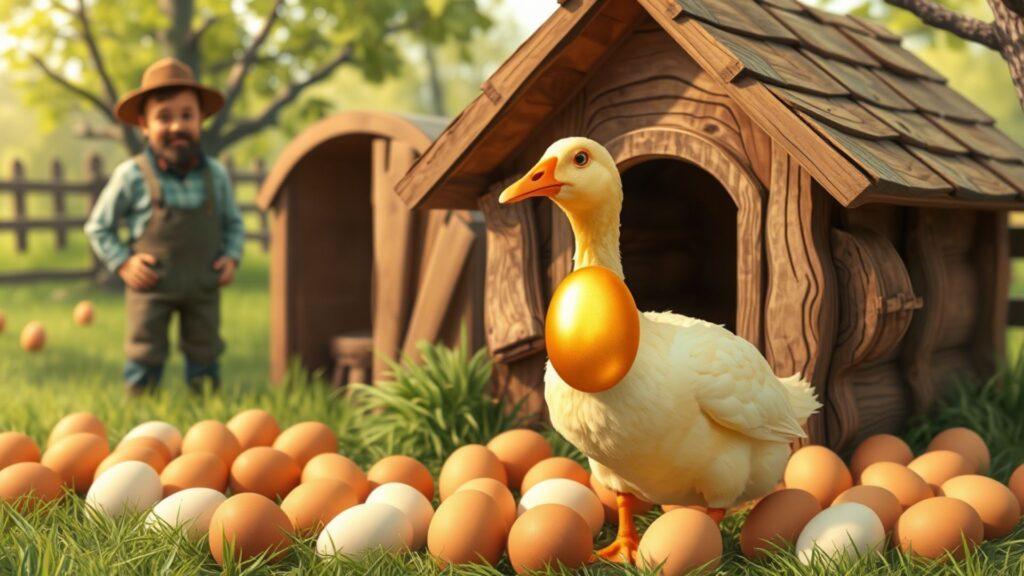
A poor farmer owns a goose that lays a golden egg every day. He becomes rich but soon grows impatient. Thinking the goose must have gold inside, he kills it to get all the gold at once. To his horror, he finds nothing. Now, without the goose, he has lost his only source of wealth. His greed costs him everything.
Moral: Greed can lead to losing what you already have.
The Dog and His Reflection

A dog finds a juicy bone and happily carries it home. As he crosses a river, he sees his reflection in the water and mistakes it for another dog with a bigger bone. Wanting that bone too, he opens his mouth to bark, but in doing so, he drops his own bone into the river.
Left with nothing, he realizes his greed and foolishness cost him his meal.
Moral: Be grateful for what you have—greed can make you lose everything.
The Crow and the Pitcher
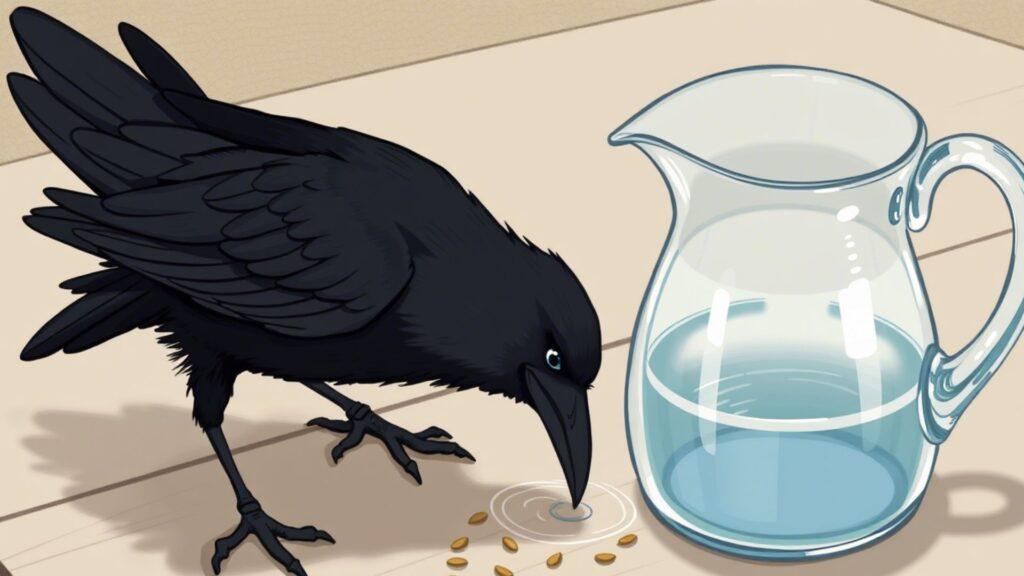
A thirsty crow finds a pitcher with a little water at the bottom. Unable to reach it with his beak, he comes up with a clever idea. He drops small pebbles into the pitcher one by one. Slowly, the water rises high enough for him to drink. His patience and intelligence save him from thirst.
Moral: Smart thinking and perseverance can solve any problem.
Wrap Up
And just like that, our stories come to an end. But the warmth they bring, the love, the laughter, and the familiar comforts stay with us.
Every story is a small reminder of life’s simple joys. A morning cup of tea, the smell of fresh-baked cookies, the sound of a favorite song. These moments may seem small, but they hold so much meaning. They remind us of love, kindness, patience, and the beauty of everyday life.
For those facing memory loss, these stories offer something familiar, something safe. A gentle hand to hold, a song to hum along to, a smile shared over a story well told. Because even as some memories fade, the feelings they bring—joy, comfort, and connection—stay in the heart.
Now take a deep breath, get cozy, and let your mind rest in the warmth of these stories. Sleep well and remember, tomorrow is a new day full of love, laughter, and new memories waiting to be made.
Mark Richards is the creative mind behind Classica FM, a podcast platform that brings stories, knowledge, and inspiration to listeners of all ages. With a passion for storytelling and a love for diverse topics, he curates engaging content—from kids’ tales to thought-provoking discussions for young adults.


